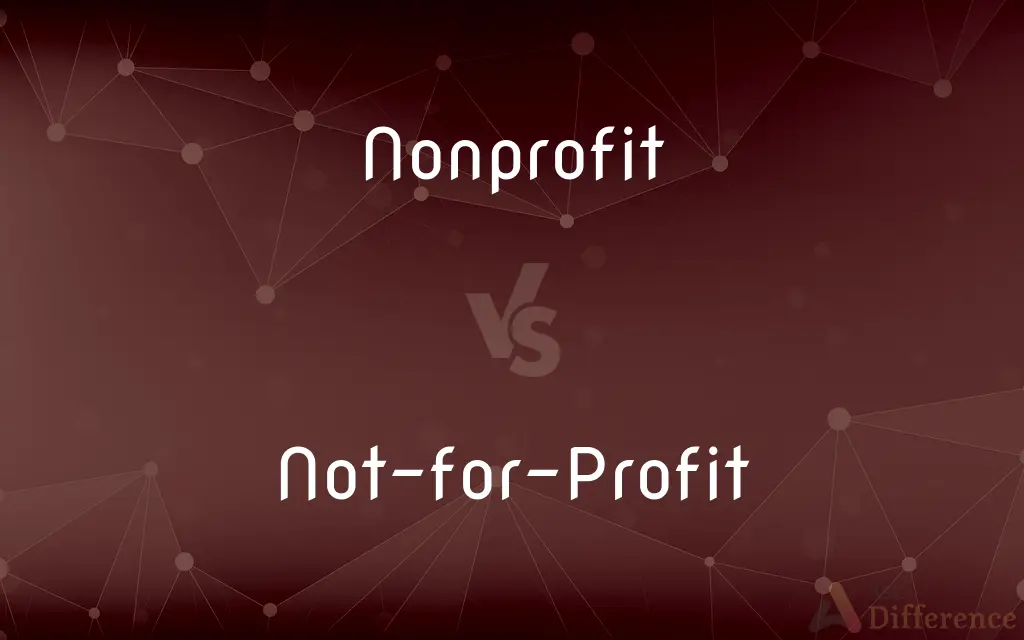Nonprofit vs. Not-for-Profit — What's the Difference?
Edited by Tayyaba Rehman — By Fiza Rafique — Published on October 6, 2023
Nonprofit organizations are dedicated to furthering a particular social cause, while Not-for-Profit organizations focus on providing a benefit but can retain some profits for organizational goals.

Difference Between Nonprofit and Not-for-Profit
Table of Contents
ADVERTISEMENT
Key Differences
Nonprofit and not-for-profit are terms often used interchangeably, but they possess nuanced differences. A nonprofit is an organization that uses its surplus revenues to achieve its purpose or mission, typically serving the public interest. They are, by design, committed to a specific cause, be it social, educational, or charitable.
On the other hand, not-for-profit entities are organized for reasons other than earning a profit, but they might not necessarily have a formal mission or purpose beyond just not distributing profits to owners or stakeholders. For instance, a local sports club may operate on a not-for-profit basis, charging just enough to cover costs.
It's crucial to understand that both nonprofits and not-for-profits can make profits, but the key difference lies in how they utilize these profits. Nonprofits channel their profits back into their mission-driven programs, while not-for-profits use them to cover operational expenses without specific objectives.
In the United States, the term nonprofit is more commonly used, especially when referring to organizations that have received a tax-exempt status from the IRS. In contrast, not-for-profit is a broader term and might not always refer to a legally constituted organization. Both terms emphasize the absence of profit distribution but differ in purpose and operation.
Comparison Chart
Definition
Organizations with surplus revenue directed to a mission.
Entities that operate without profit intentions but may lack a mission.
ADVERTISEMENT
Usage
Common in the U.S., especially for tax-exempt organizations.
Broader term, not always a legally constituted organization.
Profit Distribution
Profits reinvested into mission-driven programs.
Profits cover operational expenses without specific objectives.
Examples
Charities, research organizations.
Social clubs, hobby groups.
Legal Structure
Typically structured with bylaws, governance, and tax-exempt status.
Might not have formal structure or tax-exempt status.
Compare with Definitions
Nonprofit
Groups not distributing profits to members or stakeholders.
The nonprofit hospital reinvests all earnings into better patient care.
Not-for-Profit
May lack a formal mission or specific purpose.
The recreational soccer league is not-for-profit and just aims to promote sports.
Nonprofit
Often tax-exempt due to charitable, educational, or similar purposes.
The art museum, as a nonprofit, receives certain tax exemptions.
Not-for-Profit
Does not distribute profits to owners or stakeholders.
The community theater operates not-for-profit, ensuring ticket prices remain affordable.
Nonprofit
Organizations where surplus revenue is used to achieve a mission.
The wildlife sanctuary operates as a nonprofit to conserve endangered species.
Not-for-Profit
Entities operating without the primary goal of profit.
The local chess club functions on a not-for-profit basis, charging only membership fees.
Nonprofit
Entities dedicated to furthering a specific social cause.
The nonprofit focuses on providing education to underprivileged children.
Not-for-Profit
Focuses on activities without direct commercial gain.
The not-for-profit gardening club meets monthly to exchange plants and tips.
Nonprofit
Operates without the intention of commercial or monetary gain.
The nonprofit event promotes environmental awareness without seeking profit.
Not-for-Profit
Activities might not be exclusively charitable or educational.
The dance group is not-for-profit, hosting shows for community enjoyment.
Nonprofit
Not seeking or producing a profit or profits
A nonprofit organization.
Not-for-Profit
(of a company or organization) Providing goods or services, but not for the purpose of making a profit.
Nonprofit
An organization, such as a charity, that does not seek or produce a profit
Donated money to local nonprofits.
Not-for-Profit
A not-for-profit company or organization.
Nonprofit
Not seeking to produce a profit a financial gain.
Nonprofit
Ellipsis of nonprofit organizationan organization that exists for reasons other than to make a profit, such as a charitable, educational or service organization.
Nonprofit
Not commercially motivated
Common Curiosities
Do not-for-profit entities pay taxes?
Some might, depending on their activities and legal structure.
Can a nonprofit make a profit?
Yes, but the profit is reinvested into its mission or purpose.
Are nonprofit and not-for-profit the same?
They're similar, but nonprofits often have a mission, while not-for-profits may not.
Can a sports club be a nonprofit?
Yes, if it has a mission beyond just sports. Otherwise, it might be not-for-profit.
Can a nonprofit sell products?
Yes, but the proceeds should further their mission.
How can I start a nonprofit?
Establish a mission, create bylaws, form a board, and apply for tax-exempt status.
Do nonprofits have shareholders?
No, they don't distribute profits to shareholders.
Is every charity a nonprofit?
Most charities operate as nonprofits, but not all nonprofits are charities.
How do not-for-profits cover their costs?
Through fees, donations, or other revenue, but without distributing profits.
Are not-for-profits always small organizations?
Not necessarily; they can range from small clubs to larger entities.
Who governs a nonprofit?
Nonprofits usually have a board of directors or trustees.
What's the main goal of a nonprofit?
To serve a public or community interest, often with a defined mission.
Do volunteers work in not-for-profits?
Yes, many not-for-profits rely on volunteers.
Can not-for-profits have paid staff?
Yes, they can hire and pay staff as needed.
Share Your Discovery

Previous Comparison
Eidetic Memory vs. Photographic Memory
Next Comparison
Dubai vs. UAEAuthor Spotlight
Written by
Fiza RafiqueFiza Rafique is a skilled content writer at AskDifference.com, where she meticulously refines and enhances written pieces. Drawing from her vast editorial expertise, Fiza ensures clarity, accuracy, and precision in every article. Passionate about language, she continually seeks to elevate the quality of content for readers worldwide.
Edited by
Tayyaba RehmanTayyaba Rehman is a distinguished writer, currently serving as a primary contributor to askdifference.com. As a researcher in semantics and etymology, Tayyaba's passion for the complexity of languages and their distinctions has found a perfect home on the platform. Tayyaba delves into the intricacies of language, distinguishing between commonly confused words and phrases, thereby providing clarity for readers worldwide.












































